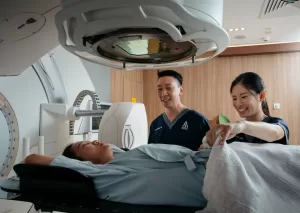What to Expect During Radiation Therapy: A Patient’s Perspective
If you’ve been diagnosed with cancer and prescribed radiation therapy, you likely have many questions about what to expect. While your medical team will provide detailed information, hearing from those who have been through it can offer valuable insight. This article aims to give you a patient’s perspective on the radiation therapy experience. From the initial consultation to the final treatment, you’ll learn about the typical process, potential side effects, and coping strategies. By understanding what lies ahead, you can feel more prepared and empowered as you begin this phase of your cancer treatment journey.
Understanding Radiation Therapy Treatment
Radiation therapy is a critical component of many cancer treatment plans. During the radiation treatment process, high-energy beams target and destroy cancer cells. Understanding what to expect can help ease anxiety and improve your overall experience. Your healthcare team will guide you through each step, from initial consultation to follow-up care. Managing radiation side effects is an essential aspect of your treatment journey, and your medical team will provide strategies to help you cope effectively.
Preparing for Radiation Therapy Side Effects
Managing radiation side effects begins before treatment starts. Discuss potential fertility impacts and explore relaxation techniques to manage anxiety. Arrange help with daily tasks and maintain a healthy lifestyle. Consider quitting smoking, as it can worsen side effects. Communicate openly with your healthcare team about concerns and medications. Understanding the radiation treatment process and potential effects empowers you to face treatment with confidence.
Common General Side Effects of Radiation Therapy
Radiation therapy can affect both cancer cells and nearby healthy tissues, leading to various side effects. Fatigue is one of the most common effects, often starting after a few weeks of treatment. Skin changes in the treated area, such as redness or dryness, are also typical. The radiation treatment process may cause temporary hair loss in the treated area and can lower blood counts. Understanding and managing radiation side effects is crucial for patients undergoing this therapy.
Specific Side Effects Based on Treatment Area
The radiation treatment process can lead to various side effects depending on the targeted area. For brain radiation, patients may experience headaches, nausea, or memory issues. Head and neck treatments often cause mouth soreness and swallowing difficulties. Chest radiation might result in coughing or shortness of breath, while abdominal treatments can lead to nausea or diarrhea. Managing radiation side effects is crucial and may involve dietary changes, medications, or other therapies to improve quality of life during treatment.
Coping with Fatigue During Radiation Therapy
Fatigue is a common side effect of the radiation treatment process, affecting over 80% of patients. To manage this exhaustion, prioritize activities and rest when needed. Light exercise, like short walks, can boost energy levels. Maintain a nutritious diet and stay hydrated while avoiding excessive caffeine. Consider mind-body practices such as yoga or meditation to reduce stress. Communicate with your healthcare team about managing radiation side effects and explore potential medical interventions if fatigue persists.
Managing Skin Changes from Radiation
Skin reactions are a common side effect of the radiation treatment process. You may experience redness, dryness, itching, or peeling in the treated area. To minimize discomfort:
- Gently cleanse with lukewarm water and mild soap
- Apply recommended moisturizers, avoiding the area before treatment
- Wear loose, soft clothing to reduce irritation
Managing radiation side effects includes protecting your skin from sun exposure. Use sunscreen and cover the treated area when outdoors. Contact your healthcare team if you notice any concerning changes or increased discomfort.
Dealing with Hair Loss During Treatment
Hair loss is a common side effect of radiation therapy, particularly when treating areas near the scalp. According to Cancer Council Australia, hair usually grows back a few months after treatment ends, but it may be thinner or have a different texture. To manage this aspect of the radiation treatment process:
- Consider cutting your hair short before treatment begins
- Protect your scalp from sun and cold with hats or scarves
- Explore wig options that match your natural hair color and style
Remember, managing radiation side effects like hair loss is an important part of your overall care. Don’t hesitate to discuss your concerns with your healthcare team.
Appetite and Digestive Issues During Radiation
During the radiation treatment process, you may experience changes in appetite and digestive function. Nausea, vomiting, and diarrhea are common side effects, particularly when treating abdominal or pelvic areas. To manage these issues, try eating smaller, more frequent meals and staying hydrated. Your care team can provide anti-nausea medications and dietary recommendations for managing radiation side effects. Maintaining good nutrition is crucial, so don’t hesitate to consult a nutritionist if needed.
Conclusion
As you prepare for radiation therapy, remember that knowledge is power. By understanding what to expect, you can approach your treatment with confidence and reduced anxiety. While the process may seem daunting, advances in technology and supportive care have made radiation therapy more precise and manageable than ever before. Your healthcare team is there to support you every step of the way. Don’t hesitate to ask questions or voice concerns. With proper preparation and a positive mindset, you can navigate this chapter of your cancer journey successfully. Stay focused on your ultimate goal – improved health and well-being. You’ve got this.
Disclaimer: The content for this article is for informational purposes only and is not a substitute for professional medical advice, diagnosis, or treatment. Always consult your oncologist with any questions regarding a medical condition. Do not disregard medical advice or delay seeking it based on information from this site.

